| Srl | Item |
| 1 |
ID:
093895


|
|
|
|
|
| Publication |
2010.
|
| Summary/Abstract |
Israel's general elections in 2009 yielded three major outcomes: 1) the replacement of the bi-polar system that characterized Israeli electoral politics between 1977 and 2003 in which most parties are aligned to one of the two principal parties by a more flexible multi-party system. 2) The nearly total collapse of the Labor party and the Zionist left; for the first time since the 1920s, the Labor party was no longer a major political player, and 3). Kadima's electoral relative success, despite scandals haunting it since 2006. Kadima has basically superseded Labor without necessarily adopting its ideology. We argue (contrary to Henry Kissinger's quip that Israel never had a foreign policy but only a domestic policy) that primarily external factors and processes - chiefly the failure of the Oslo process in the 1990s - yielded these three outcomes.
|
|
|
|
|
|
|
|
|
|
|
|
|
|
|
|
| 2 |
ID:
093902
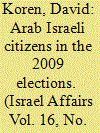

|
|
|
|
|
| Publication |
2010.
|
| Summary/Abstract |
The 18th Knesset currently seats 13 Arab and Druze MKs. This is one MK fewer compared to the corresponding figure in the 17th Knesset and the number of MKs representingpredominantly Arab parties hardly changed (increasing from 10 to 11). These minor changes are surprising considering the formative nature of the events in the Jewish-Arab arena during the three years since the last elections. The article suggests that the same events which intensified the Arab desire to separate from the Jewish majority - The Israeli operation in Gaza during December 2008-January 2009 ("Cast Lead") and the "Israel Beytenu" party's campaign which has placed the issue of Israeli Arabs' loyalty to their state at the top of its agenda - were the ones who motivated the Arabs to participate eventually in the elections to allay outcomes they perceived as deleterious to their interests.
|
|
|
|
|
|
|
|
|
|
|
|
|
|
|
|
| 3 |
ID:
093899
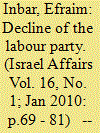

|
|
|
|
|
| Publication |
2010.
|
| Summary/Abstract |
This article presents the main reasons for the gradual decline, and eventually the marginalization, of the Labour Party. It starts with a general discussion of the decline of dominant parties in democratic political systems followed by a review of Labour's decline. Then it proceeds to analyze in detail the reasons for Labour losing its centrality in Israeli politics. The article concludes with a few thoughts about the future of Israeli politics.
|
|
|
|
|
|
|
|
|
|
|
|
|
|
|
|
| 4 |
ID:
093901


|
|
|
|
|
| Publication |
2010.
|
| Summary/Abstract |
The Israel Our Home (Israel Beiteinu, IB) party became the major surprise of the 2009 elections, winning 15 Knesset seats. Two-thirds of these seats were won through Russian speakers, who entered Israel in the recent waves of Russian Jewish immigration; and a third came from veteran and native Israelis. This composition showed a major dilemma of IB - to find a modus vivendi between the party's nationwide aspirations and its predominantly Russian community character. The IB's electoral success was a result of its concept of a 'population and territories exchange', which was a 'neo-centralist alternative' to both the 'land for peace' of the left and the 'peace for peace' concepts of the right, as well as the charismatic figure of the party leader Avigdor Lieberman, who better than anybody else succeeded in expressing the feeling of frustration of the various peripheral groups in Israeli society.
|
|
|
|
|
|
|
|
|
|
|
|
|
|
|
|
| 5 |
ID:
093897
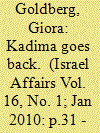

|
|
|
|
|
| Publication |
2010.
|
| Summary/Abstract |
Kadima lost the 2009 elections to the Likud after it had come to power in the 2006 elections. While Kadima only lost one seat (28 instead of 29), and even remained the largest party in the Knesset, it had no chance of remaining in power. Kadima is the most important phenomenon in the Israeli party system in recent years. Despite the fact that it did not win the 2009 elections its influence on the political system has been enormous. After its victory in 2006 Labour and Likud tried to copy it, as happens with every successful product. The best way to relate to Kadima is as a completely different phenomenon, in terms of the standard tools of the historical party map and the traditional division into blocs. This approach denies the former five conceptions of Kadima: a classic centre party, a neo-centrist party, a centrist party in the left bloc, a faction in the Likud or a middle party.
|
|
|
|
|
|
|
|
|
|
|
|
|
|
|
|
| 6 |
ID:
093898
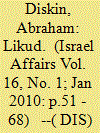

|
|
|
|
|
| Publication |
2010.
|
| Summary/Abstract |
In 1957 Downs claimed that most voters tend to hold centrist views. Hence, political parties should adopt centrist stands in order to attract as many voters as possible. Another aspect of the 'political centre' derives from prominent theories on coalition formation: the political party that captures the 'median' position in the parliament enjoys a tremendous advantage. The battle over the control of 'the centre' played a major role in the strategy of Likud in the 2009 Knesset elections, and in its ability to form a coalition following the elections. Although Kadima won one more seat than Likud, it lost the battle on the centre. Netanyahu, loyal to his centrist tendencies during the campaign, preferred to have only a segment of Labour in his coalition, at the cost of five ministerial posts, rather than to enjoy the support of the radical National Union at the cost of a single ministerial post.
|
|
|
|
|
|
|
|
|
|
|
|
|
|
|
|
| 7 |
ID:
093896
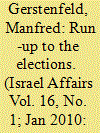

|
|
|
|
|
| Publication |
2010.
|
| Summary/Abstract |
On 26 October 2008 President Shimon Peres called for new elections. The Knesset was dissolved on 11 November. Three candidates claimed that they were in the running for prime minister: Livni, Netanyahu and Barak. The election campaign would focus more on individuals than on parties. The security issue took high priority in the elections. A major issue throughout the campaign was the position of the leading parties on the establishment of two states for two peoples as part of a peace agreement. The internet became a major tool in the campaign. On the morning of 27 December, the IDF began a war in the Gaza Strip, which Israel called Operation Cast Lead. The major parties agreed to suspend their campaigns until the end of the war. Kadima's victory with 28 seats came as a surprise. The Likud came second with 27 seats, having lost voters at the end of the campaign to the third largest party Yisrael Beiteinu, which ended up with 15 Knesset seats. Looking back at the election campaign one can best define it as a broken and shortened one.
|
|
|
|
|
|
|
|
|
|
|
|
|
|
|
|
| 8 |
ID:
093900


|
|
|
|
|
| Publication |
2010.
|
| Summary/Abstract |
This study examines the respective performances of the various religious parties in the 2009 election. It concludes that while the ultra-Orthodox (Haredi) parties broadly maintained their electoral strength, the national religious parties were rocked by debilitating conflicts, ideological splits and intra-institutional fractures which resulted in a substantial decrease in their Knesset representation.
|
|
|
|
|
|
|
|
|
|
|
|
|
|
|
|